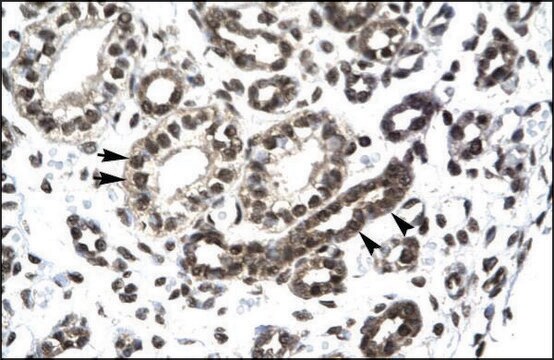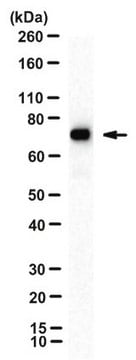MABE191
Anti-WHSC1/NSD2 Antibody, clone 29D1
clone 29D1, from mouse
Synonyme(s) :
Probable histone-lysine N-methyltransferase NSD2, Multiple myeloma SET domain-containing protein, Nuclear SET domain-containing protein 2, Protein trithorax-5, Wolf-Hirschhorn syndrome candidate 1 protein
About This Item
Produits recommandés
Source biologique
mouse
Niveau de qualité
Forme d'anticorps
purified immunoglobulin
Type de produit anticorps
primary antibodies
Clone
29D1, monoclonal
Espèces réactives
human
Technique(s)
ChIP: suitable
immunoprecipitation (IP): suitable
western blot: suitable
Isotype
IgG2bκ
Numéro d'accès NCBI
Numéro d'accès UniProt
Conditions d'expédition
wet ice
Modification post-traductionnelle de la cible
unmodified
Informations sur le gène
human ... WHSC1(7468)
Description générale
Immunogène
Application
A representative lot was used by an independent laboratory to detect WHSC1/NSD2 in transfected Gal4-reporter/293T cells. (Marango, J., et al. (2008).
A representative lot was used by an independent laboratory to detect WHSC1/NSD2 in KMS11 cells. (Marango, J., et al. (2008). Blood. 111:3145-3154.)
Qualité
µµ
Description de la cible
Forme physique
Autres remarques
Vous ne trouvez pas le bon produit ?
Essayez notre Outil de sélection de produits.
Code de la classe de stockage
12 - Non Combustible Liquids
Classe de danger pour l'eau (WGK)
WGK 1
Point d'éclair (°F)
Not applicable
Point d'éclair (°C)
Not applicable
Certificats d'analyse (COA)
Recherchez un Certificats d'analyse (COA) en saisissant le numéro de lot du produit. Les numéros de lot figurent sur l'étiquette du produit après les mots "Lot" ou "Batch".
Déjà en possession de ce produit ?
Retrouvez la documentation relative aux produits que vous avez récemment achetés dans la Bibliothèque de documents.
Notre équipe de scientifiques dispose d'une expérience dans tous les secteurs de la recherche, notamment en sciences de la vie, science des matériaux, synthèse chimique, chromatographie, analyse et dans de nombreux autres domaines..
Contacter notre Service technique








